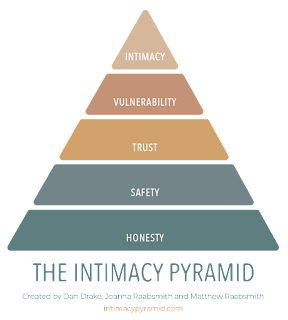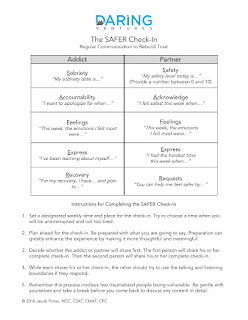Building on a Foundation of Honesty: How to Best Support Our Husband's Recovery
When someone has been unfaithful, used lies and manipulation in order to continue behaviors without facing consequences, and spent a significant amount of time betraying themselves by behaving in ways that are inconsistent to their own values, honesty becomes extremely difficult. An alternate reality is created through justification and ideas of victimhood in order to continue to engage in these behaviors. These ideas and attitudes become so deeply ingrained that even when confronted with verifiable evidence of their inappropriate behaviors, the person will deny the evidence or communicate only enough information to cause the inquiry to stop. The foundation of the relationship is destroyed.
Most betrayed partners, upon discovery of any kind of infidelity, rely upon their spouse's or boyfriend's description of what has occurred.
Sadly, up to this point in my work with partners, each one I have spoken to initially whole-heartedly believes the account which has been shared, yet each one eventually found out more information was withheld. They experienced what they described as an even more painful betrayal: knowing their significant other had seen their immense pain and still lied to their face.
I am very glad each partner believes the story they have heard. Please hear that statement. It is healthy and normal to give those we love the benefit of the doubt, and I honor assuming the best of others. Many also have great compassion for those who have betrayed. They desire to support and encourage healing and restoration.When these same clients ask me how they can best support their spouse, fiance, or boyfriend, I always share with them that they did not cause the infidelity nor can they fix it. What they can do is focus on receiving support themselves and offering their significant other a chance to receive the antidote for addiction: intimacy.
In order to heal (and in order to possibly heal a relationship), the unfaithful must rebuild their lives on a foundation of honesty in order to have the authentic intimacy that heals the wounding that caused the betrayal in the first place. Honesty must be rigorous and complete which creates the opportunity to be fully known even though they might suspect doing so will result in being rejected.
An informed partner can offer an opportunity for their unfaithful partner to participate in a Full Disclosure that can include a polygraph. She can learn how committed he is to healing and to restoring their relationship by his willingness or unwillingness to be fully open about what he has hidden. A Full Disclosure is an excellent tool for breaking out of denial and seeing actions clearly - a jump start toward healing and making amends. It can be the beginning of creating the foundation of a life of complete honesty.
Many partners do not choose to offer this opportunity initially for understandable reasons. Unfortunately, this can often lead to the significant other becoming more efficient at hiding acting out behaviors. The partner is left with unanswered questions and an adrenal system on constant high alert. Future betrayals become a cycle with periodic "relapses" and "struggles." Many betrayed partners become stuck on a rollercoaster of betrayal and partial reconciliation which causes mental, spiritual, and physical harm.
There are certain seasons of life including pregnancy and times of serious health struggles where requesting a Full Disclosure is not the appropriate decision at the time. It is important that we weigh the pros and cons of using this tool while also bearing in mind that addictions do not heal without significant work and support. Addictions, sadly, escalate.
Would you like know more about how you can support your husband's recovery or receive more information about Full Disclosure? Schedule a free consultation with Coach Casey here.



Comments
Post a Comment